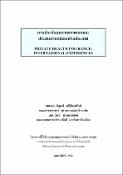บทคัดย่อ
Private Health Insurance : International ExperiencesThe study objectives were to review roles of private health insurance in other countries, to analyse health care systems in which the development of private health insurance was influenced, and to understand pros and cons of available private health insurance in relation to the development of health care systems. The study was based on the secondary data published in journals, research reports and meeting reports. It has been found that the historical development of state governance was an influential factor to the development of private health insurance in many countries. The US private health insurance was dominant while the UK’s and the Canadian’s were relatively inferior to the public health insurance system as both had the national health insurance system. The tradeoff of health insurance dominance between the public and the private was obviously seen in a number of countries. In the UK and Australia, the private health insurance was supplementary to the public’s while the private health insurance in Germany was an equally alternative to the compulsory public health insurance. The Singaporean national health insurance, called Medisave was so effective leading to small growth of the private insurance. Some countries like Egypt had fragmented health insurance system in which the private health insurance was able to share a significant proportion of the insurance market. Although private health insurance more or less unburdened the public health budget, most problematic findings were the lack of control over health care expenditure, inaccessibility to particular groups, high administrative costs, unnecessarily insured services, and cream-skimming implementation. There is a note that private health insurance system tended to violate the principle of equity considered as important for the view of social welfare.


